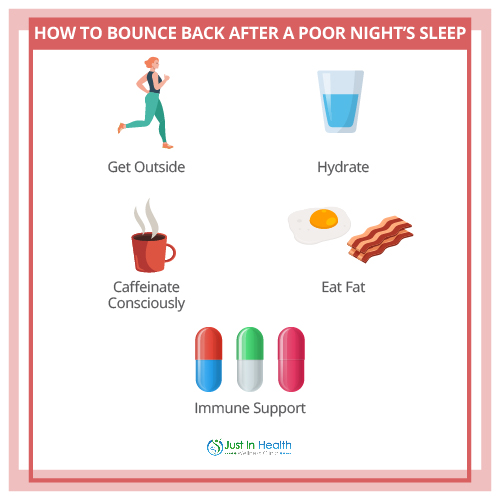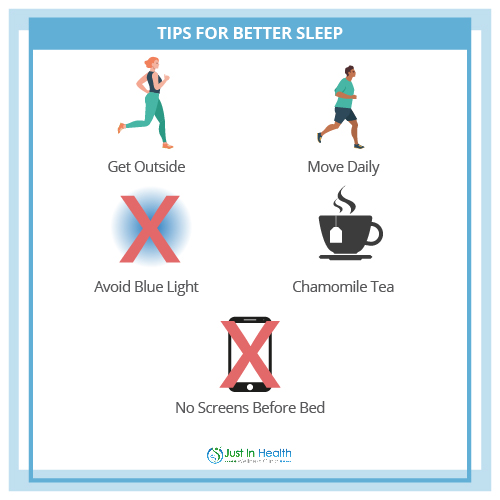

By Dr. Justin Marchegiani
Let’s face it, most of us aren’t having a perfect night’s sleep, every single night. Whether it’s an impending deadline has you crunching out work til the wee hours of the morning, a racing mind keeping you up, or a night of tossing and turning, most of us know what it’s like to go through life the day after a crummy night’s sleep.
Today I want to outline the best ways to bounce back after a poor night’s sleep, as well as provide you with tips to optimize your sleep quality on a nightly basis. Let’s dive in!

Get Outside: The best way to set your circadian rhythm (your body’s internal clock) is to get outside! Sunlight signals to the photoreceptors in your eyes and skin that it is day time and boosts alertness (and improves mood, which helps with sleep deprived grumpiness!). Take your shoes off and let your feet touch the earth. The electrical exchange of free ions from the earth are scientifically proven to lower inflammation and help cellular health, which is much needed after missing sleep.
Hydration: Sleep is when the body repairs both physiologically and psychologically. Muscles, bones, ligaments, neurotransmitters, hormones, and more are recycled and repaired during the night to keep us functioning optimally. When we miss a night of sleep, it’s crucial to support cellular health. One way to boost cellular health is to hydrate while replenishing minerals. Add trace mineral drops or even a high quality sea salt to your water. This helps optimize the cellular environment, prevents effects of dehydration, and curves appetite.
Caffeine: When you miss a night of sleep, you may be extra drawn to the coffee maker. Be cautious not to overcome caffeine, or else you may suffer the consequences when you hit the pillow that night. Stick to one or two cups of coffee, tops.
Diet: Sleep deprivation does weird things to hunger hormones! Cravings can come on strong, while satiety may never seem to come. Don’t give in! Keep carbs low and eat protein and foods rich in healthy fats to assist your body during this time of physiological stress.
Immune Support: During a normal sleep cycle, the immune system fights to keep your body healthy. When you miss sleep, immune system function declines while inflammation increases. When you miss sleep, you’ll want to use supplementation to boost your immune system. Oil of oregano, probiotics, Immuno Supreme, and activated charcoal are all immune supporting supplements that can really support you when you’re sleep deprived!
Awareness of the cause of sleep deprivation is the first key to unlocking the door to a great night’s sleep. Physical factors such as sounds, temperature, and light are some of the easiest to resolve. You essentially want to be sleeping in a cool, dark, quiet cave. I recommend blackout curtains. You can use a white noise machine to help lull you to sleep if there are neighborhood noises that distract you from sleeping. Also, be sure the temperature is not too warm. It can be appealing to climb into a warm cozy bed, but biologically we need to be sleeping at around 65 degrees.
If your sleep disturbances are psychological or hormonal in nature, such as work stress of an autoimmune condition, I recommend a consultation with a functional medicine doctor who can help you address the underlying issue and help you fix things at the root of the problem.

Get outside and move every day. Exercise can increase human growth hormone which has an excellent effect at blunting cortisol and increasing the repair of your body. As discussed, natural sunlight and grounding set your circadian rhythm, which tells your body when it’s time to be awake, and when it’s time to wind down.
Avoid blue light and reduce EMF at night. Blue light (emitted from screens and devices) signals to your body that it is day time, and keeps you up for hours after you last saw a screen. Limit screen time before bed, and if you must be on a device, look into apps that block or reduce the blue light they emit.
To calm down before bed, try a relaxing tea, like chamomile, which can increase neurotransmitters like GABA to help promote relaxation.
Do you have other tips for better sleep? Share down in the comments below!
References:
http://www.ncbi.nlm.nih.gov/pmc/articles/PMC2077351/
http://www.ncbi.nlm.nih.gov/pubmed/12480364
http://www.scienceoflight.org/wp-content/uploads/2015/02/journal_pone_0092251.pdf